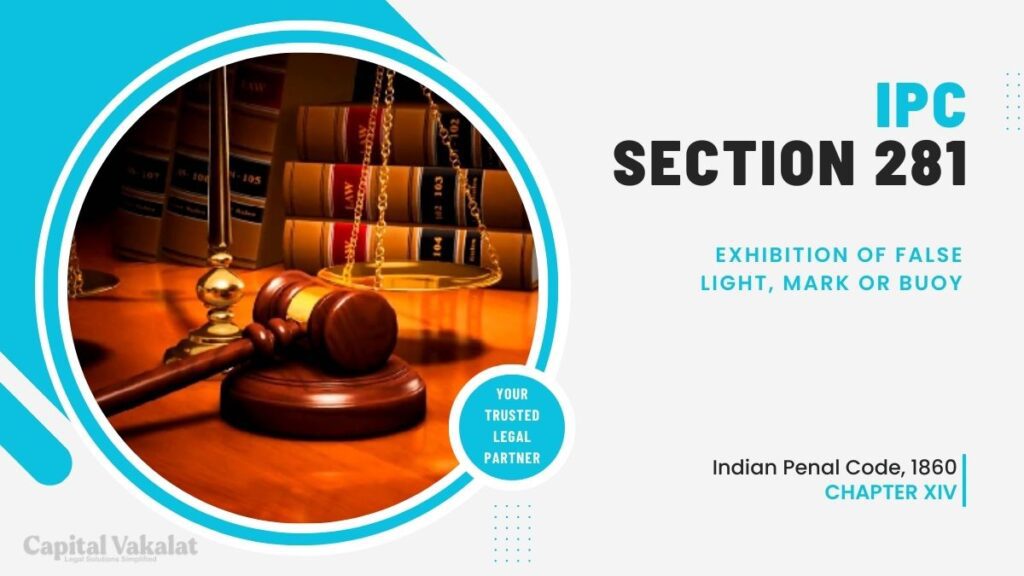The Indian Penal Code (IPC) encompasses a wide range of provisions to maintain law and order, protect property, and ensure the safety of individuals. One such provision, Section 281 IPC, deals with the “Exhibition of false light, mark, or buoy.”

This article delves into the details of Section 281 IPC, its significance, and the legal aspects surrounding it.
Introduction to Section 281 IPC
Section 281 of the Indian Penal Code is a crucial legal provision that addresses the intentional exhibition of false lights, marks, or buoys. This section primarily concerns maritime safety and the prevention of accidents at sea. It aims to ensure the safety of ships, navigators, and the marine environment.
Understanding Exhibition of False Light, Mark, or Buoy
The exhibition of false lights, marks, or buoys refers to the deliberate act of displaying misleading signals or markers on land or water bodies. This can have severe consequences, such as leading ships off-course, causing accidents, or even endangering lives.
Legal Provisions Under Section 281 IPC
Section 281 IPC makes it illegal to exhibit false lights, marks, or buoys with the intent to deceive or endanger any ship, vessel, or aircraft. Violation of this section constitutes a criminal offense and is subject to legal consequences.
Key Elements of Section 281 IPC
To be charged under Section 281 IPC, certain key elements must be proven:
- Intent: The accused must have the intent to deceive or endanger maritime traffic.
- False Representation: The exhibition must involve false lights, marks, or buoys.
- Consequences: The act should have the potential to mislead or endanger ships, vessels, or aircraft.
Penalties for Violating Section 281 IPC
If found guilty of violating Section 281 IPC, the accused can face penalties, including imprisonment and fines. The severity of the punishment depends on the specific circumstances of the case and the extent of danger caused.
Land and Maritime Applications
While Section 281 IPC primarily pertains to maritime safety, it is also applicable to land-based situations where misleading markers can cause harm or accidents. This extends its reach to various aspects of public safety.
Case Studies
To illustrate the importance of Section 281 IPC, we can examine real-life case studies where the exhibition of false lights, marks, or buoys led to accidents or endangerment. These examples highlight the necessity of such legal provisions.
Challenges in Enforcing Section 281 IPC
Enforcing Section 281 IPC poses several challenges, including identifying the culprits, proving intent, and gathering evidence. The authorities responsible for maintaining maritime safety must overcome these hurdles to ensure compliance.
Preventing and Reporting Violations
Preventing violations of Section 281 IPC requires a combination of education, awareness, and stringent enforcement. Individuals and organizations must be vigilant and report any suspicious activities related to false lights, marks, or buoys.
Conclusion
In conclusion, Section 281 IPC plays a crucial role in safeguarding maritime traffic and public safety. Its provisions aim to deter individuals from engaging in activities that could lead to accidents or disasters. Adherence to this section ensures a safer environment for all navigators, and its enforcement is essential to maintaining law and order.
Frequently Asked Questions
Can land-based incidents also fall under Section 281 IPC?
Yes, Section 281 IPC is applicable to land-based situations where misleading markers can cause harm or accidents, extending its scope beyond maritime safety.
What are the penalties for violating Section 281 IPC?
Penalties for violating Section 281 IPC can include imprisonment and fines, with the severity of punishment depending on the circumstances of the case.
How can individuals and organizations contribute to preventing violations under Section 281 IPC?
By being vigilant and reporting any suspicious activities related to false lights, marks, or buoys, individuals and organizations can contribute to preventing violations of Section 281 IPC.
What challenges are associated with enforcing Section 281 IPC?
Challenges in enforcing Section 281 IPC include identifying the culprits, proving intent, and gathering sufficient evidence to prosecute violators.